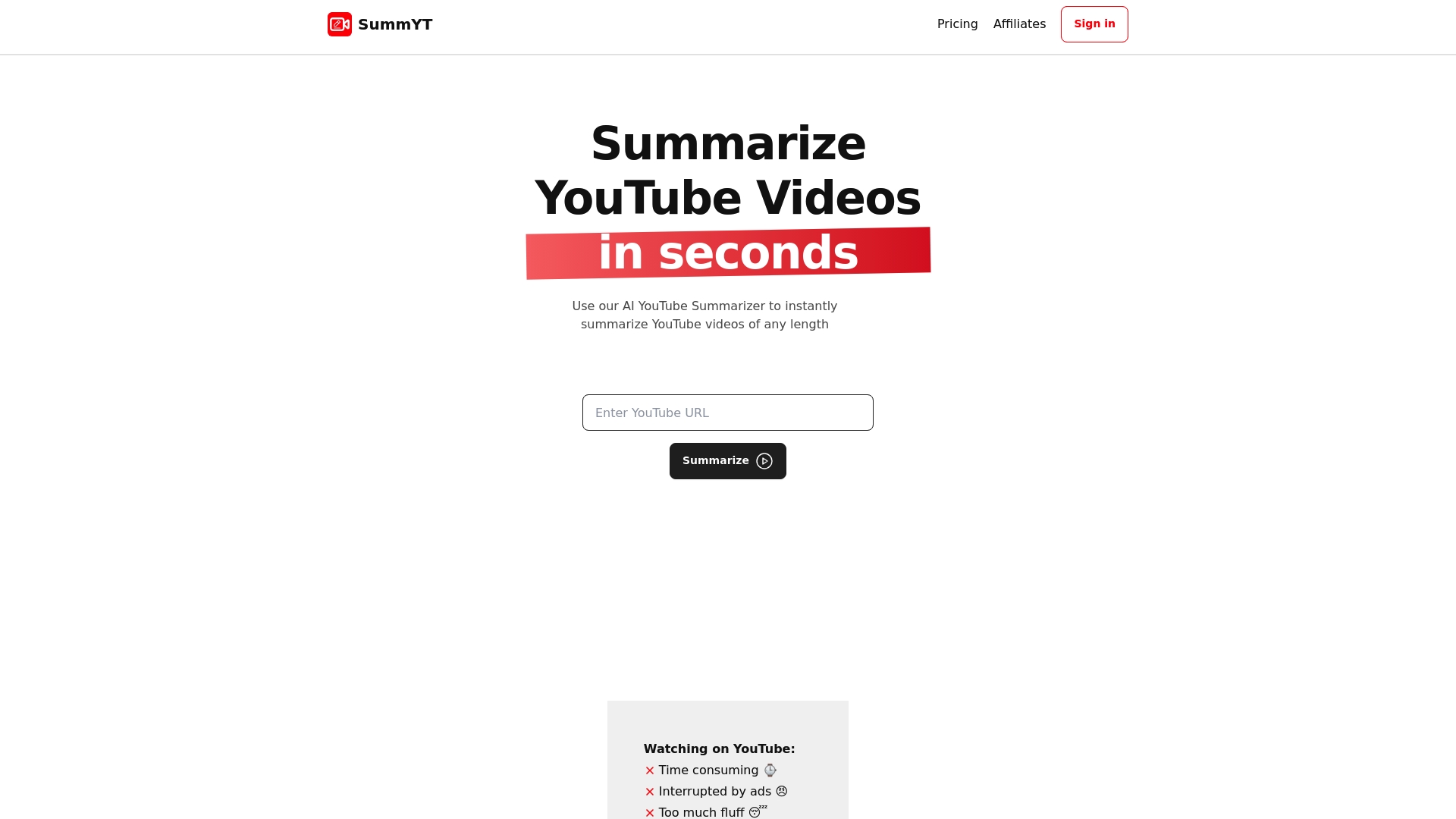Understanding the Role of Summarizers for Students

Students face more information than ever before and academic materials keep getting denser each year. Yet even with all this growth, attention spans and study time have not increased. In fact, summarization tools can reduce reading time by over 50 percent for some learners, but the real power of these tools does not just save minutes. The real surprise is how they actually shape the way your brain learns and remembers things long after the reading is done.
Table of Contents
- What Are Summarizers And Their Purpose?
- The Importance Of Summarizers In Student Learning
- How Summarizers Enhance Comprehension And Retention
- Key Techniques Used By Summarizers For Students
Quick Summary
| Takeaway | Explanation |
|---|---|
| Summarizers condense complex information efficiently | These digital tools distill extensive content into concise formats for easier understanding. |
| Cognitive load reduction enhances learning | By simplifying information, summarizers help students focus on important concepts without feeling overwhelmed. |
| Personalized learning experiences boost comprehension | Summarizers adapt to individual needs, making complex subjects more engaging and accessible for students. |
| Effective summarization fosters long-term retention | By engaging with condensed content, students strengthen mental connections and improve memory of key concepts. |
| Advanced algorithms ensure content integrity | Summarizers utilize natural language processing and machine learning to preserve the original meaning while summarizing. |
What Are Summarizers and Their Purpose?
Summarizers are intelligent digital tools designed to condense complex information into concise, digestible formats that capture the essential meaning and key insights of original content. These powerful technologies help students, professionals, and researchers quickly understand and process large volumes of information without spending excessive time reading through entire documents or transcripts.
The Core Function of Summarization
At their fundamental level, summarizers work by analyzing text or multimedia content and extracting the most significant points, themes, and arguments. Advanced text processing algorithms enable these tools to identify critical information by employing techniques like natural language processing, semantic analysis, and machine learning. The goal is not merely to reduce text length but to preserve the original content’s core message and intellectual substance.
Why Students Need Summarization Tools
Students face unprecedented information complexity in academic environments. Textbooks, research papers, lecture recordings, and online resources often contain dense, nuanced content that requires significant time and cognitive effort to comprehend fully. Summarizers address this challenge by providing rapid comprehension solutions that help learners:
- Extract key concepts and arguments quickly
- Reduce study time and cognitive load
- Improve retention of critical information
- Create efficient study materials and notes
Read more about effective summarization techniques that can transform how students approach learning and information processing. By transforming lengthy content into clear, structured summaries, these tools become indispensable academic companions in the modern digital learning landscape.
The Importance of Summarizers in Student Learning
Summarizers have transformed how students engage with educational content, offering unprecedented opportunities to optimize learning efficiency and comprehension. By intelligently distilling complex information into concise, meaningful formats, these digital tools address critical challenges in modern academic environments.
Cognitive Load Reduction and Information Processing
Students today are bombarded with extensive academic materials that demand significant mental energy to process. Educational psychology research demonstrates that cognitive overload can dramatically reduce learning effectiveness. Summarizers serve as critical cognitive support mechanisms, enabling students to:

- Navigate large volumes of information more efficiently
- Focus on core concepts without getting overwhelmed
- Allocate mental resources more strategically
- Develop stronger comprehension and retention skills
Personalized Learning and Academic Performance
Beyond simple information reduction, summarizers provide personalized learning experiences that adapt to individual student needs. Advanced summarization technologies can help learners customize their study approaches, making complex subjects more accessible and engaging. Explore advanced techniques for video-based learning that demonstrate how these tools transform traditional educational paradigms.
By breaking down intricate academic content into digestible insights, summarizers empower students to learn more effectively, reduce study time, and develop critical information processing skills essential for academic and professional success.
Below is a table summarizing the main benefits and impacts of summarizers on student learning, as discussed throughout the article.
| Benefit | How It Helps Students |
|---|---|
| Cognitive Load Reduction | Simplifies and condenses information, making study materials less overwhelming |
| Improved Comprehension | Focuses attention on key concepts for deeper understanding |
| Enhanced Retention | Strengthens mental connections and boosts memory of core ideas |
| Personalized Learning Experience | Adapts summaries to each student’s needs and learning style |
| Time Efficiency | Reduces reading and studying time by over 50 percent for some learners |
| Support for Academic Success | Helps create efficient notes and study materials, supporting higher performance |
How Summarizers Enhance Comprehension and Retention
Summarizers play a transformative role in students’ learning processes by creating powerful cognitive bridges that connect complex information with deeper understanding. By strategically extracting and organizing key concepts, these tools facilitate more efficient knowledge acquisition and long-term memory formation.
Neurological Mechanisms of Learning Optimization
Cognitive science research reveals that summarization activates critical neural pathways responsible for information processing and retention. When students engage with condensed content, their brains can more effectively:
- Prioritize important information
- Create stronger mental connections
- Reduce cognitive overwhelm
- Accelerate comprehension speed
Strategic Knowledge Integration
Effective summarization goes beyond simple information reduction. It involves sophisticated cognitive strategies that help learners transform passive reading into active learning experiences. By breaking down complex concepts into digestible segments, summarizers enable students to:

- Identify core arguments and themes
- Recognize underlying relationships between ideas
- Develop critical analytical skills
- Build more robust mental frameworks
Explore advanced video learning techniques that demonstrate how intelligent summarization tools can revolutionize educational comprehension. These technologies represent a significant leap forward in personalized learning, allowing students to navigate increasingly complex academic landscapes with greater confidence and efficiency.
Key Techniques Used by Summarizers for Students
Summarizers employ sophisticated technological approaches to transform complex information into concise, meaningful representations. These advanced techniques leverage cutting-edge algorithms and linguistic processing to extract and synthesize essential content across various academic materials.
Natural Language Processing and Content Analysis
Advanced text processing strategies enable summarizers to deconstruct and reconstruct information with remarkable precision. By analyzing semantic structures, these tools can:
- Identify core arguments and central themes
- Extract key sentences and propositions
- Recognize contextual nuances
- Maintain original content integrity
Intelligent Information Extraction Methods
Sophisticated summarization technologies utilize multiple computational techniques to generate high-quality summaries. These methods go beyond simple text reduction, implementing complex strategies that:
- Apply machine learning algorithms
- Recognize hierarchical information structures
- Dynamically adjust summarization based on content type
- Preserve contextual relationships between concepts
Explore comprehensive lecture summarization techniques that demonstrate the intricate process of transforming extensive academic content into digestible, meaningful insights. By combining linguistic analysis, machine learning, and intelligent pattern recognition, these tools represent a significant advancement in educational technology and information processing.
This table organizes the advanced techniques used by summarizer tools, helping readers understand the technological approaches described in the article.
| Technique Type | Key Features | Impact on Summarization |
|---|---|---|
| Natural Language Processing (NLP) | Analyzes semantic structure, extracts core arguments | Maintains meaning, identifies important ideas |
| Content Analysis | Recognizes key sentences, context, and nuances | Preserves content integrity |
| Machine Learning Algorithms | Learns patterns in information, adapts to content types | Adjusts summary approach for better results |
| Hierarchical Information Recognition | Identifies themes and relationships between ideas | Organizes content logically |
Turn Complex Video Content Into Clear Insights Instantly
If you have ever felt overwhelmed by lengthy YouTube lectures, dense educational videos, or endless tutorials, you are not alone. In this article, we explored how summarizers help students fight information overload, reduce cognitive fatigue, and extract key concepts more efficiently. Modern learning demands rapid comprehension and retention, but watching hours of video wastes precious time and energy.

Let SummYT take the pressure off. With its AI-powered YouTube summarizer, you gain:
- Instant, accurate highlights from any video so you never miss important information
- Personalized comprehension tools geared to your learning goals
- Mobile-friendly and browser extensions for seamless study anywhere
Stop letting complex video lectures drain your study hours. Visit SummYT and experience how AI video summaries can transform your academic performance and save you countless hours. Sign up now to get unlimited summaries and achieve more in less time.
Frequently Asked Questions
What is the main purpose of summarizers for students?
Summarizers are digital tools that condense complex information into concise formats, helping students quickly grasp key concepts and arguments without extensive reading.
How do summarizers help reduce cognitive load for students?
By distilling large volumes of academic materials into manageable summaries, summarizers enable students to focus on essential information, allowing for more efficient study and comprehension.
What techniques do summarizers use to extract information?
Summarizers utilize advanced natural language processing, semantic analysis, and machine learning algorithms to identify core themes, extract key sentences, and maintain the integrity of the original content.
Can summarizers improve students’ retention of information?
Yes, summarizers aid in retention by prioritizing important information and creating connections between ideas, enabling students to build stronger mental frameworks for long-term memory.




